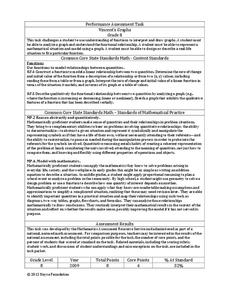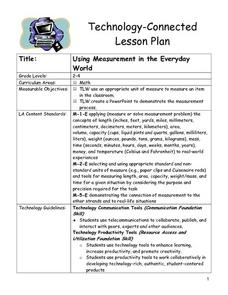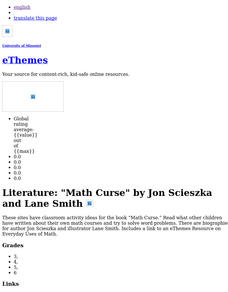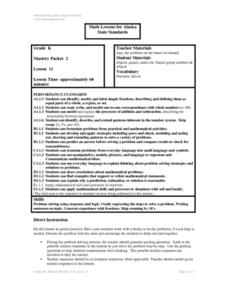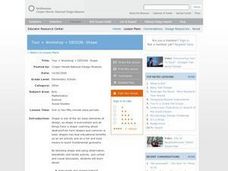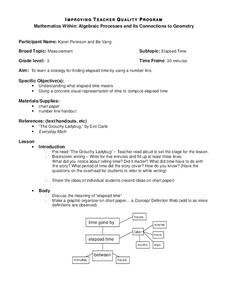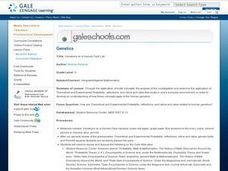Curated OER
Symmetry in Shapes and Everyday Objects
Fifth graders discover lines of symmetry for shapes and everyday objects. In this lines of symmetry lesson, 5th graders use a butterfly outline to find lines of symmetry. Students analyze everyday objects for symmetry and use...
Curated OER
Math Investigations
Students demonstrate how math is used in everyday life. In this math investigation activity, students develop a class-list of ways they use math everyday. Students define math vocabulary words, such as "counting," "daily life," and...
Curated OER
"Math Curse" by Jon Scieszka
Students explain everyday uses of numbers and relationships of numbers.
Curated OER
Money Word Problems for Grade 4
In this money word problems for grade 4 worksheet, 4th graders answer 10 multiple choice questions about money, not interactively, then scroll down to see the answers.
Curated OER
Math Skills for Everyday: Filling Out Income Tax Forms
Students accurately assess their own income taxes using actual tax forms. They read and fill out the proper forms.
Inside Mathematics
Hexagons
Scholars find a pattern from a geometric sequence and write the formula for extending it. The worksheet includes a table to complete plus four analysis questions. It concludes with instructional implications for the teacher.
Inside Mathematics
Vencent's Graphs
I like algebra, but graphing is where I draw the line! Worksheet includes three multiple-part questions on interpreting and drawing line graphs. It focuses on the abstract where neither axis has numbers written in, though both are...
Inside Mathematics
Expressions
Strive to think outside of the quadrilateral parallelogram. Worksheet includes two problems applying prior knowledge of area and perimeter to parallelograms and trapezoids. The focus is on finding and utilizing the proper formula and...
Chicago Botanic Garden
Are You Bigfoot?
Scholars independently explore several websites to calculate their ecological footprint. Using their new found knowledge, they answer six short-answer questions and take part in a grand conversation with their peers about how...
Curated OER
Using Measurement in the Everyday World
Students use an appropriate unit of measure to measure an item in the classroom. They create a PowerPoint to demonstrate the measurement process. Pupils are divided into pairs. Students use a concept map to discuss the terms for...
Curated OER
"Math Curse" by Jon Scieszka and Lane Smith
Young scholars access web sites have classroom activity ideas for the book "Math Curse." They read what other students have written about their own math curses and try to solve word problems.
Curated OER
Mirror, Mirror on the Wall, Who Needs Math in Life at All?
Students think and talk about the ways in which they use math throughout the day. They add each way to a "math in real life" bulletin board and reflect in writing on the ways they use math.
Curated OER
Math: Graphs and Their Symbols
Second graders examine different types of graphs and discover the meanings of the symbols used on them. After gathering data about themselves, their communities, and the world, they use that information to create graphs. Among the...
Curated OER
Fraction Problem Solving Process
Help your charges solve a variety of fraction and skip counting problems using a problem solving process. As a class they work through a fraction problem step-by-step, and discuss a real-life connection to the problem. Students then play...
Curated OER
Tour + Workshop = DESIGN: Shape
Ask elementary students to explore shapes in everyday objects. They will discuss the elements of design and describe the shapes they see in visual images. Students will then design and "build" a new 3D shape. Finally they will show and...
Curated OER
Finding Equations
Students make equations from everyday data. They create a graph from the equations. Students predict and analyze the results. Students complete the second scenario on their own and turn in their handout.
Curated OER
One-digit Division
Young mathematicians read the book, The Doorbell Rang. They examine the necessity of division in everyday life, such as cooking and sharing. They use paper cookies to construct equivalent sets.
Curated OER
Can You Count on Cans?
How can a canned food drive be connected to math? It's as simple as counting and organizing the cans! Children demonstrate their ability to sort non-perishable foods into categories that include soup cans, vegetable cans, boxed items,...
Curated OER
A Practical Application For Area
First graders investigate the concept of surface area and find the coverage for the surfaces in a building that includes carpet or walls. The application of finding the area is practical using the everyday objects to help them to make...
Curated OER
One Step at a Time
Students investigate the customs and habits of other cultures by reading letters from a Peace Corps Volunteer. In this global customs lesson, students discuss how analyzing a culture is similar to analyzing art, no two people see...
Curated OER
Measurement
Third graders explore a strategy for finding elapsed time by using a number line. They identify what elapsed time means. Students investigate a concrete visual representation of time to compute elapsed time. They read, " The Grouchy...
Curated OER
Variations on a Human Face Lab
Ninth graders gain an application level understanding of probability, symmetry, and ratios and rates that exists in one's everyday environment relative to human genetics.
Curated OER
Government Goods and Services
Fifth graders investigate the connection between taxes and government services. In this economics lesson plan, 5th graders discuss the process and benefits of paying sales and income taxes. Using calculators, students compute...
Curated OER
Relationship Between Addition and Subtraction
Students are taught how to add and subtract and use number sense to solve basic math problems. In this addition and subtraction instructional activity, students are being taught using theories from different philosophers in education....






